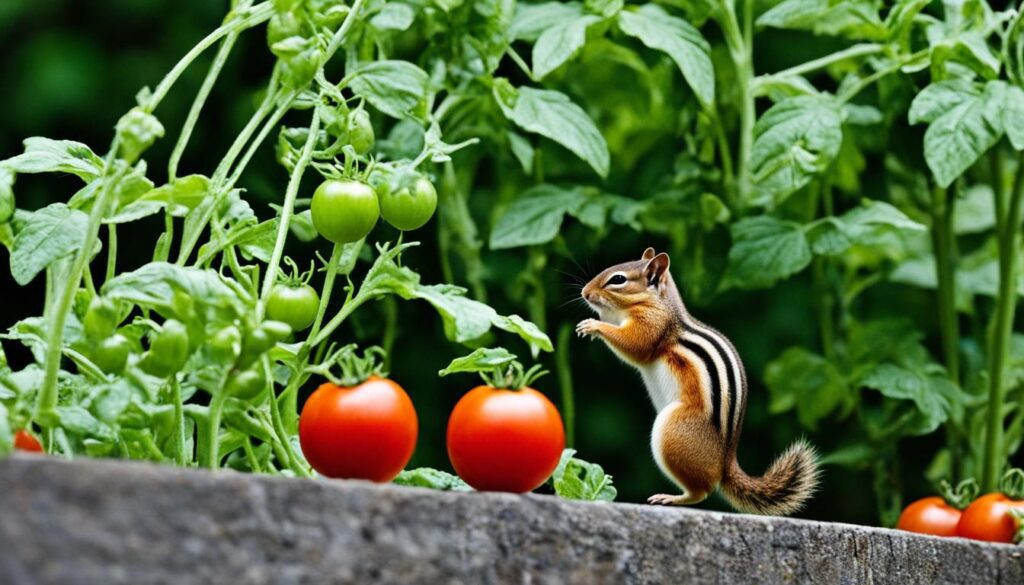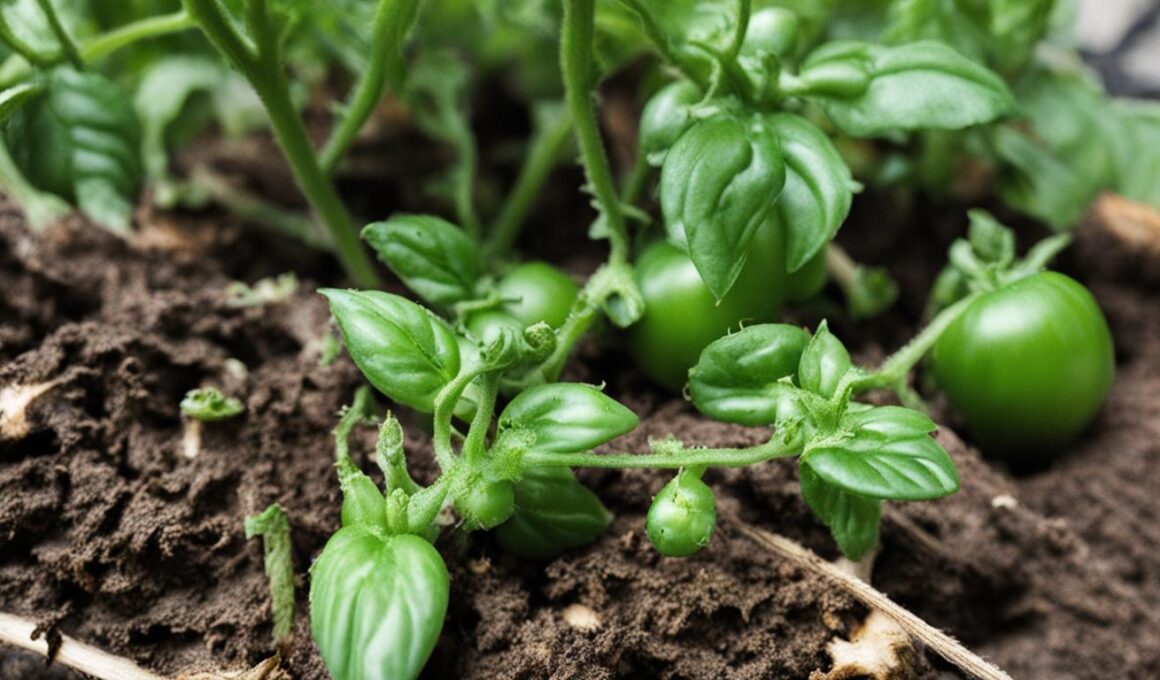Are you wondering if chipmunks eat tomatoes? Well, the answer is yes. Chipmunks are omnivorous creatures that indulge in a variety of plant-based foods, including tomatoes. If you’re a garden enthusiast, you may be familiar with the frustration of discovering your precious tomato plants damaged by these pesky critters. In this article, we’ll explore how chipmunks can harm your tomato plants and provide effective methods to protect them.
Chipmunks are known to take bites out of ripe tomatoes, sometimes devouring the entire fruit. Furthermore, they may not spare green tomatoes, particularly when they are thirsty and seek liquids found in the fruits. However, it’s crucial to ensure that chipmunks are genuinely responsible for the damage. Other animals like insects, deer, and birds can also feast on tomatoes. Look for telltale signs such as small bites on multiple tomatoes, holes in the leaves, and footprints in the soil to identify chipmunk activity.
Now that you know chipmunks indeed eat tomatoes and can cause damage, it’s time to explore how you can protect your tomato plants from these mischievous critters. Let’s dive into the next section to understand how to identify chipmunk damage and take the necessary preventive measures.
Identifying Chipmunk Damage to Tomato Plants
Chipmunks can cause significant damage to tomato plants, affecting both the fruits and the overall health of the plant. It’s important to identify the signs of chipmunk activity early on and take appropriate measures to deter them from eating your tomatoes.
One of the most common signs of chipmunk damage is finding small bites on multiple tomatoes. Chipmunks are known to take a few bites out of each fruit, leaving them partially eaten and often wasting a bunch of tomatoes in the process.
Another telltale sign is the presence of small holes in the ground. Chipmunks are burrowing creatures and may dig these holes as they forage for food. Additionally, you may notice damaged plants or objects in your garden, as chipmunks can chew on leaves, stems, and even the fruit itself.
Footprints in the soil can also indicate chipmunk activity. Take a close look at the ground around your tomato plants and see if you can spot their tiny paw prints.
It’s crucial to catch chipmunks in the act to confirm their presence in your garden. Monitoring your plants and staying vigilant will help you identify chipmunks as the culprit behind the damage to your tomatoes.
It’s worth noting that chipmunks may eat tomatoes not only for the fruits but also for the water content they provide, particularly in the summer. Ripe tomatoes can serve as a natural source of moisture for chipmunks.
In the image above, you can observe typical chipmunk damage to tomato plants, including partially eaten fruits and small holes in the ground.
Now that you can recognize the signs of chipmunk activity, it’s time to explore effective strategies to deter them from eating your tomatoes. These methods will be covered in the next section.
Protecting Your Tomato Plants from Chipmunks
When it comes to protecting your tomato plants from chipmunks, there are several effective strategies you can employ. One option is to create physical barriers using materials such as chicken wire, hardware cloth, or bird netting. These barriers can be placed around your tomato plants to prevent chipmunks from accessing them.
Make sure the barrier has small enough gaps to prevent chipmunks from squeezing through. Additionally, burying the barrier deep enough will discourage chipmunks from digging underneath it. Regular monitoring is crucial, as chipmunks can be resourceful and may find ways to overcome these barriers.
Another effective method is using natural repellents that chipmunks dislike. Consider planting mint around your tomato plants as chipmunks find its strong scent unpleasant. You can also sprinkle cinnamon or use spicy scents like chili or pepper around your garden to deter chipmunks.
Removing any food and waste from your garden can also help keep chipmunks away. Chipmunks are attracted to a food source, including fallen fruits and vegetables. By eliminating these temptations, you can make your garden less appealing to chipmunks.
Furthermore, using chipmunk-proof bird feeders can prevent chipmunks from accessing bird food and, subsequently, deter them from your garden.

By implementing these methods, you can effectively protect your tomato plants from chipmunks and ensure a bountiful harvest.
Conclusion
Protecting your tomatoes from chipmunks is essential to ensure a successful harvest. These pests can cause significant damage to your garden, eating both ripe and green tomatoes, and even consuming the entire plant. However, there are effective measures you can take to control chipmunks and safeguard your tomato plants.
Start by identifying signs of chipmunk activity in your garden. Look for small bites on multiple tomatoes, holes in the leaves, and footprints in the soil. Once you’ve confirmed their presence, it’s time to take action.
Creating physical barriers is an excellent way to prevent chipmunks from accessing your tomato plants. Use materials like chicken wire, hardware cloth, or bird netting to enclose your garden. Ensure that the barriers have small enough gaps to keep chipmunks out and bury them deep enough to deter digging. Regular monitoring and adjustment of these barriers are necessary, as chipmunks can be resourceful.
Additionally, consider using natural repellents that chipmunks dislike. Mint, cinnamon, and scents like chili or pepper can help keep them away. Removing any food and waste from the garden, as well as using chipmunk-proof bird feeders, can further discourage their presence. By combining these preventive measures and regularly monitoring your garden, you can effectively protect your tomatoes from chipmunks and enjoy a bountiful harvest.
How Can I Protect My Tomato Plants from Chipmunks and White Bugs?
To safeguard tomato plants, keen white tomato plant bugs identification is essential. Chipmunks are deterred with mesh barriers and aromatic plants, while neem oil or insecticidal soap can thwart white bugs. Regular inspection and prompt action prevent an infestation, ensuring a bountiful, healthy harvest.








